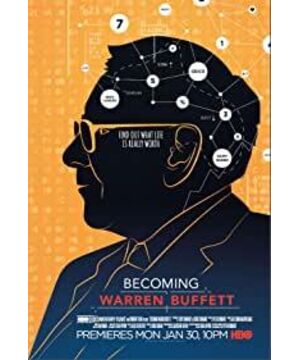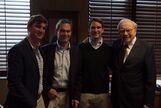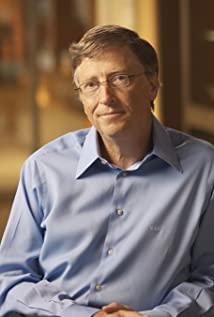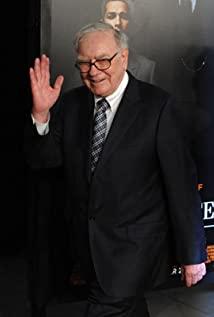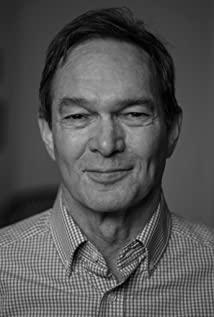"Becoming Warren Buffett"
Writing this film review is also quite time-consuming, because Chinese subtitle files cannot be found online, and it is more troublesome to conduct text research.
I even took the time to add the subtitle guy's WeChat, and said a lot of good things, but people just don't give subtitles, although his WeChat advertises "subtitles can be requested", maybe people really think "Becoming Warren Buffett" is to get rich password. No way, I can't take the time to translate English subtitles, because of my perfectionist personality, it will take more than half a month. Fortunately, the search skills that I have cultivated over the years led me to turn to an English course website, copy and paste it many times, and found the subtitles. Unexpectedly, the "residual value" of this rich man is really inexhaustible. English courses can also use it as a resource. Of course, as a perfectionist, I checked again. It was found that the content up and down the website was actually only half. I had no choice but to spend two hours patiently transcribing the remaining subtitles one by one. To save time, I'll be in the middle, constantly searching for relevant words. As a result, I discovered another mystery, where there is something to lose, there is something to gain. This is the truth. It turned out that all the comments (excerpts from the film's subtitles), including the English class website, focused only on the first part of the documentary. The second half is ignored. Just because the first part is about how Buffett "makes money", and the second half is about how he "spends money" (naked donations) (of course, and family chores). Then, I discovered that the so-called "becoming" is not just about becoming a rich old man. The "becoming" of this documentary is more about making us a great old man.
If you want to find a spokesperson for Taoist philosophy in modern times, I think it is Buffett. Whether it's being a rich old man or being a great old man.
1. Be a rich old man.
There is a powerful thing in this world, it's called everything is taught to you, but you can't learn it. In particular, those who want to learn from Buffett basically want to invest, and those who want to invest are more "urgent" for money, so they run counter to Buffett's basic rules from the beginning.
Buffett's law of getting rich is actually nothing but Taoist philosophy. What is Taoist philosophy about? Simple, focused, natural.
Buffett does have his talent, of course, the talent is not to inherit his mother's extraordinary computing power (although in the film, Buffett's sister brags about his brother like this. But we all know that Buffett's computing talent, at best, is on par with him, or even surpasses him. There are too many people), and in fact, it is not a "money-loving nature" (it looks like an iron rooster, but the naked donation shows that people are not miser), but a "clumsy" who is "big and clumsy". Where is the humble embodiment?
As he taught his kids: When I was in middle school, there were only two things on my mind, girls and cars, and I didn't get along with girls, so we talked about cars. If he has a graceful demeanor and a tongue-in-cheek tongue, then he spends his mind on picking up girls all day, and naturally he has no time to make the first pot of gold, accumulate wealth and experience, and he will not think about life (think about it, Einstein The same is true, the teenager is too clumsy, so he spends more energy on philosophical thinking)! Think about it, he would buy a discounted "hearse" and use it to pick up girls for prom. So, he talks about philosophy from the "car": Now what I want to suggest to you is that you don't have only one car in your life, but you only have one body and one brain, that's what you have, the body And the brain feels good now, but it's with you for the rest of your life. This sentence is not only the old man's words, but also the teaching of the good and the good to the children. And this teaching is actually the essence of Taoist thought: understanding "Tao", understanding "law", and clarifying "essence". It is only in the "clumsy" that we can wake up to the fundamentals: life is short, and the human body is like a car. The current condition is good, but it is actually deteriorating, and the key point is that this car cannot be replaced. This kind of understanding is actually the same as the "moving things out of the burning house" that Bill Gates realized when he was a child.
On this basis, we will understand what is important and how to live in life? Why have your own business? What is the real value of life. At this point, Buffett has reached high ground.
Because of this, Buffett has been more concerned about his own way of life since he was a child (he was keen to make money from trading since he was a child, but in essence, he cares more about his way of life: but I like to be my own boss... I can arrange what I like route, no one bothers me at five or six in the morning). Because of this, Buffett strives to be a better version of himself. When he finds his weakness, he actively changes it: I used to be afraid of speaking in public. It's about developing people's ability to speak in public, so I saw an ad in the newspaper for Dale Carnegie's course, and I went. If I hadn't completed that course, my whole life might have been different (I remember being very withdrawn in middle school, and I also found Bendall Carnegie's "The Weakness of Human Nature," changed).
The first is simple.
We can see that Buffett's life is very simple, even stingy. In his later years, Buffett still insisted on going to McDonald's to buy breakfast on the way to work. He said: When I don't think the market is not so prosperous, I may eat $2.61 with two pork pies in it. I put them together, Pour yourself a Coke. $3.17 is bacon, eggs, and cheese biscotti; but if the stock goes down in the morning, I'd like to skip the 3.17 and get the 2.95. Although we can make the interpretation of "putting all the money on investment", it is obviously boring to care about a few dollars. The point is that these three options are very simple, and the logic of the selection is also very simple. Buffett is happy eating McDonald's, just as he likes Coca-Cola and ice cream. "The Tao Te Ching" says: "The sage goes to the extreme, to the extravagant, to the Thai." It also says: "The five colors make people blind, the five sounds make people deaf, the five flavors make people feel good, galloping and hunting makes people mad, and rare goods make people hampered. . It is a saint, not for the belly, so go to each other and take this." Buffett loves to eat, precisely because he only retains the most basic happiness: cheap and simple food, full and sweet.
Because life is simple enough, Buffett is more of a fool in other ways. Fortunately, Buffett's wife Susie has a good dad who reminds his daughter early in the morning: You can't talk to him like you talk to most normal people, but he has a heart of gold. Suzy once had a cold and couldn't go to the bathroom to vomit or something. She asked Buffett to get a plate for herself, but Buffett came with a colander. Suzy reminded him that the colander had holes, and he went to get a baking tray mat. Suzie complained: "In a sense he's aloof, it's hard to connect on an emotional level because I don't think that's how he basically works, he's there, but he's been upstairs. read. I kept telling my mother we were talking syllables, and when he had something in his head, you lost him. He's probably thinking before you come in and really wants to keep thinking, he's not like the rest of us.
It is because of simplicity that we can focus. Buffett himself said: I like to sit down and think, I spend a lot of time doing this, some of the time is useless, but thinking about business and investment is really fun, very simple! People's questions are the hardest, and sometimes there are no good answers to people's questions, but there are always good answers about money (obviously, many great scientists have this quality too, check the biographies of some of the previous great scientists film, we can understand that). It is because life is simple and there is no distraction, so Buffett also has time to read and think. Now he also says: I still spend five to six hours a day reading. As Susie said: You can tell his way of life, he doesn't buy a lot of paintings or big houses. It's all spiritual to him, and money is his scoreboard. He used to tell me that everyone can read my books and it's a level playing field. He likes that because he wants to win, he's all alone in the office, reading books that everyone can read, but he likes the idea of winning.
Not only is life simple, so is Buffett's work: I work with a group of people who make my life easy and take good care of me, 25 people in our office. If you go back, it's still those 25 people. We don't have any committees at Berkshire, we don't have a PR department, we don't have investor relations, we don't have a general council, we don't have a human relations department, we don't have anything of the sort. It's a life I enjoy, it's not burdensome for me, it's basically entertainment. Obviously, this structure has made Buffett's company more efficient and more cohesive.
Second focus.
"Tao Te Ching" emphasizes concentration: Can you live without leaving? (It carries blood, energy, and mind, and is unified and inseparable. To put it bluntly, the spirit and action focus are the same). In the film, Buffett said: Bill's father asked each of us to write down the word that helped us the most on a piece of paper. Bill and I both wrote the word "focus" at the same time. Focus is the strongest part of my personality, and if I'm interested in something, I'm really interested. If I'm interested in a new topic, I'll want to read about it. I want to discuss it, I want to meet the people involved. We all like to work hard, you know, we don't like boring stuff. I don't know how to cook, art, that stuff, I don't know the color of my bedroom and living room walls, we're on a satellite phone, I don't care about the physical universe; but the business universe, I think I understand. Newton was also a dedicated man, but historically he lost a lot of money because of stocks. Why because of his investments, his focus is not on stocks. For him, stocks can only be a short-term investment, like a question with a quick answer; not the gravitational pull that has been tangled in his mind for years. Bill Gates originally thought that he and Buffett would be different, but they met late, precisely because the basis of the two successful people is the same.
third nature.
Taoist philosophy is to talk about "Tao", "people follow the earth, the earth follows the sky, the heaven follows the Tao, and the Tao follows the nature", which is to talk about laws. Buffett's key is to respect the law. The keys to "making money" that we saw in the film are actually all in line with the truth.
First of all, respect the law, because the law is magical and full of power, and even its power cannot be stopped. In fact, Buffett is already enlightened. Just as he used a car as a metaphor for the body that entrusts life, the way of life is so simple.
Buffett's biggest experience is "compound interest." Buffett tells the story we've all heard: Einstein once famously said that "compound interest" is the eighth wonder of the world. There is a story you may have heard in school. Someone does something for the king, and the king says, what can I do for you. He said, take a chessboard, put one grain in the first square, two in the second, and double it in the third, the king really agreed, when he figured out the 64th square In all, he had given out the food of the entire kingdom. So it's a simple truth, and at the end there will be extraordinary results.
We have really heard this story, we watched "Smart Yixiu" when we were children, and we also know this story. However, as the Tao Te Ching says: The sergeant listens to the Tao and acts diligently. The sergeant heard that if it lived or died. The corporal laughed. Let's take it as a joke, and take it as a story to show off our knowledge. But Buffett has insisted since he was a child. As a kid, Buffett insisted on this: I delivered 500 newspapers a day, and I earned a penny for one newspaper, and for compound interest, that penny was exchanged for something else. What's the meaning? He just insisted on earning money to continue investing, continuing to make money, relying on money to make money, and finally rolled into a big snowball: I will tell you how to do it, have you ever seen a juggler juggling 25 milk bottles? How did he do it? The answer is that he starts with one bottle, then two or three, and sticks to it! There will be 25 soon, and so are we. So even if Buffett doesn't invest in stocks, we know he can be rich.
We don't seem to see patterns, only changes. In fact, the Tao Te Ching also talks about many changes: existence and non-existence, difficulty and ease complement each other, long and short complement each other, high and low complement each other, sound and sound harmonize, and front and rear follow each other. Buffett takes this very seriously.
For one, he was so awed by "failure" that he was as afraid of going to the other side as we were, so he did this: I came to the South Omaha library, and I got 7 old copies for $1. New York Times". There was the Panic of 1907, which was obviously 1929, and I wanted to put on the wall the era of the real panic on Wall Street, as a reminder that anything can happen in the world, and I'm serious, it's instructive sexual art. Moreover, he also emphasized: Rule 1, don't lose money; Rule 2, don't forget Rule 1. We all know that no one wants to lose money. However, because of fear of failure, we will carefully master the law and wait for a good harvest. Buffett was a good student, he didn't come up with ideas, he just followed what the teacher taught. Buffett said: Ben Graham created the concept of value investing. He believes in scrutinizing a company's financial statements, and if you buy value, you're going to have good results, so when it comes to looking back at a younger age, other people might buy previous Playboys or whatever, but I'd buy Moody's Handbook. When I graduated, I started selling stocks. I was 20, looked like 16, acted like 12, so I wasn't the most admirable trader I've ever seen myself, but I'd read the pages looking for undervalued stocks , is it the same as looking at old family photos, better than looking at that. Fear of failure and reluctance to lose money. What Buffett does is do his homework, and that's the real awe. So much so that the partner said: When I first saw Warren back in 1959, I immediately found out that he was a very smart man. In the past four or five years, the stock market has been running at a high speed, and he has probably predicted a better industry that has not yet been formed. He is a very smart person, so the stock market is correcting the previous wrong predictions, not making correct predictions.
Second, start from the opposite. The dialectics is the most familiar to the Chinese. Few people have paid attention to the countermeasures proposed by the Tao Te Ching: the action of the opposite is the action of the Tao, and the use of the Tao of the weak. Buffett got his start by relying on "cigarette butts". He spent a lot of money on very cheap tradable securities, and Warren was talking to small companies at the time, and his investments were usually buying companies that looked like cigarette butts, but someone was still smoking. He wanted to buy at the right time, profit from the guy who smoked . If it's cheap enough, he doesn't care how bad the company is or how bad management it has, he knows he's making money no matter what, because they're cheap. Simply put, buying cheap stocks is because according to the law, there is still room for growth when they are cheap, and this room is profit.
How to deal with "uncontrollable laws", the key is "the use of the weak". To deal with powerful laws, it is not to make yourself stronger, because no matter how powerful you are, you cannot be big enough to control all the variables; to deal with powerful laws, you must make it clear that you are "weak". Buffett introduced his teacher this way: Professor Graham of Columbia University, Ben is an incredible teacher. He wasn't contrived at all, and he put his heart and soul into us. The teacher's point of view is: Are Wall Street professionals' short-term forecasts really better than long-term forecasts? Our research shows that choosing between flipping a coin and listening to experts yields similar results, like learning big baseball from someone who can hit 400 yards. If it can't be done, how can it be done? Buffett really asked for advice on playing baseball, he said: Ted Williams wrote a book called "The Science of Batting," I think there's 77 squares in the strike zone, and he said, if I wait, at his best hit He'll hit 400 from the spot, and maybe 235 if he's going to the lower corners. In investing, I'm in a business with no hits, and it's a business at its best. I can look at 1000 different companies and I don't have to look at every one of them, not even 40 of them, so I can choose the ball I want to hit and wait for the one that's in your sweet spot. People shouted: Swing, you are stupid! ignore them. In the stock market, there is a temptation to make frequent moves, simply because they are so easy to change, that you will find you miss a lot in a few years. I understand what I call a circle of competence, so I stay in that circle and I don't have to worry about things outside that circle. It's important to be clear about what you're playing and where you have an edge.
In short, Buffett knew that he could not grasp the big laws and many changes, so he limited himself to a small scope. To put it plainly, don't research too many stocks, narrow the scope, and improve the quality of the research.
How to narrow the scope? Everyone knows that Buffett likes to invest in what he likes. Specifically, he said this: I would look for companies with moats around them. We have a company on the west coast called Sees Candies, Sees Candies Boxed Chocolate. If you gave your girlfriend this on the first date, would she kiss you? We are your boss, you know? I mean, we can raise your price tomorrow, if you buy a box of the same tomorrow, you won't be able to pass the test, the key is to respond. You don't want to go home with your wife or sweetheart on Valentine's Day, of course it's better to be the same person, you won't say darling, I won the low bid, that's useless. Price is somewhat intangible. If you have an economic castle, people will come and take the castle and drive you away, so you better have a moat, you better be in the castle, have a knight and know what he's doing. You're not buying an asset, you're buying a name, a brand, you're buying the real right to operate here. So Buffett understands it this way: Today, The Coca-Cola Company sells 2 billion eight ounces, single-form or other Coca-Cola products, and if you make a penny a day on each, that's 20 million a day, $7.3 billion a year, that's really good, When you have Coca-Cola, you have the ideas of billions of people. Buffett's nagging, in fact, is such a truth. Everyone buys a thing out of the habit of "love". So it is easy to ignore the issue of price. Buy stocks of this product with the least worry. Think about it too, how the earth has changed, it is still difficult for everyone to stop drinking Coca-Cola. Even though it's what Jobs called sugar water.
Third, face failure. Buffett is a man, not a god. He also fails at times. However, he knows how to sum up failures and even take failures.
In the film, Buffett has two failures. Buffett introduced: I first bought a stake in Berkshire in 1962. It was a textile business in the north that was doomed to disappear. Statistically it's a cheap stock doing bad business, Berkshire Hathaway was closing factories, and as they closed the factories, they freed up some assets, and then they repurchased the shares. I was buying some stocks thinking that at some point there would be other offers and we would sell when the stock had a decent yield, and once the management asked me what price it would make an offer for our stock and I said 11.5 Dollar. A few months later, the quotation came, 11.375 yuan, which was 0.125 yuan cheaper. That pissed me off, so I started buying more shares, and I felt like I was being cheated by management. Warren said in his recollection that it was stupid. If you're emotional when investing, you can't do well, you can have all kinds of emotions about stocks, and stocks don't have emotions about you.
This failure does not seem to be a failure, because Berkshire is Buffett's current stronghold. However, it is clear that Buffett has spent a lot of time and sacrificed in order to transform and transform, so he believes that this is a failure.
Another failure was more serious. Invest in Solomon Bank. In the words of the film: It took him 20 years to build his reputation and only five minutes to lose it. Originally, investing in Solomon was against Buffett's previous investment philosophy, and his partners also opposed it. And after the investment, something really happened: August 1991, a bad day. The securities firm of Salomon Brothers is under investigation for improper trading of long-term debt, with Salomon admitting to exceeding limits on trading government bonds and, in one instance, using the name of an unwitting client to buy bonds. Salomon Brothers is under investigation by Treasury, Federal Reserve, SEC and Justice Department
But more important than the corporate fraud itself, it will take a toll on the credibility and credibility of the U.S. market. The company owes $150 billion in debt
More debt than any private company in the United States. But Buffett bravely took it upon himself as Solomon's interim chairman, and he used his authority to convince the US Treasury: I'm going to convince the Treasury that what they've done in the past is horrible and stupid, and they have the right to take drastic measures against us. But this business employs 8,000 people, and unless we're allowed to continue, we're going out of business. Warren believed in a too-big-to-fail solution, but the terms were not implemented at the time. And he believes Solomon will be too big to fail: If Solomon shuts down other vital parts of Wall Street, we hear the death knell from the Treasury. I'm defending my wealth, I'm sure my voice is loud. I said, Nick, this is the most important day of my life; I really feel like this is going to turn into a catastrophe... So the Treasury Department changed the statute and implemented it, it's a support, a huge support, it saves Solomon.
It is clear that the government should investigate Solomon and impose punishment. But Buffett, out of assuming his own mistakes (think, investing in Solomon, if Solomon goes bankrupt, Buffett will also lose a lot, or even go bankrupt), and out of the overall situation, persuaded the government to solve the crisis of Solomon and himself (of course, this is also the case) There are disadvantages. If it is too big to fall, it will also cause corruption.
Two, become a great old man.
An investor, no matter how successful, is an investor. After all, he is a "passenger". The Tao Te Ching says: The way of heaven is like a bow. Those who are high will suppress it, and those who are low will lift it. Those who have excess damage it, and those who lack it make up for it. The way of heaven is to make up for what is lacking. The way of man, otherwise, the damage is not enough and the service is more than enough. Who can have more than to serve the world, only the Tao. It is to act as a saint and not to rely on it, to succeed and not to go anywhere. It doesn't want to see the virtuous!
Buffett, the real success, the real greatness lies in this.
First of all, he knew that he was lucky, God's favorite. He said: The truth is. I am very lucky to be in my position. When I was born in 1930, the ratio I was born in the United States was about 40 to 1. I won the ovarian lottery on day 1, plus I'm a male and half and half again. My odds of being born in the US as a male are 80:1. That has been quite important in my whole life. To think about what makes me, above other humans. Everyone is fair, I can't follow that reasoning.
Secondly, he knows how to follow the way of heaven "to make up for what is lacking". Just as Bill Gates slowly realized the essence of "wealth", he realized that in addition to making money, the more important thing is to spend money. Buffett also didn't like donations at first, he didn't want to give a lot of money, he got richer every year, but Warren didn't say anything, and some people criticized him very harshly. According to the description of the film, it seems that the death of his wife Susie made Buffett understand wealth again. Suzy has been doing charity work, like the ladies do. However, the illness took Susie's life, despite Buffett's wealth. Susie died, Buffett felt this way: Love is a very strange thing, you can't control her. If you have love for people, you will get more love. If you hold on tight, you will lose. Suzy shaped me. She believed in me, she made me, I wouldn't be what I want to be without her, but I wouldn't, I wouldn't be successful in my career without her. She made me a whole person. So, Buffett donated a lot of his wealth. He not only donated the largest personal donation to the Bill Gates Foundation; he also let his children set up different funds, using their own focus, to help people in need through different levels and fields (according to the donation project at the end of the film, It can be seen that as long as the focus is on women, children, education, environmental protection and other fields). Buffett said: In my life, I have spent less than 1% of what I have earned. The remaining more than 99% will be given to others. Because it doesn't work for me. So it would be foolish not to give useful things to people who can use them. It didn't work for me. I am proud of what we have done.
In the end, Buffett fits both the spirit of Taoism and the principles of Confucianism.
We might think, work hard to make money, and then spend less than one hundred people, but donate it all. What's the trouble with this? As the "Bible • Ecclesiastes" said: the preacher said, the vanity of vanity, vanity of vanity. Everything is vanity. In his later years, Buffett has experienced ups and downs and experienced the world, and naturally he understands the real perception: Where is the real value and wealth? As the film evaluates: Even more powerful than Buffett's donation is his message to other wealthy Americans: The people who have the least in the world should benefit from the people who have the most. Buffett has truly respected the "Tao" of the natural, cycle. It also reflects the Confucian "virtue, meritorious deeds, and reputation". The real value of creating the name "Buffett" is not just a rich man, a stock god, but a great man who sets an example for the rich and guides future generations in the direction of life.
So much so that Buffett can get a more perfect life, when a reporter asked him: Are you afraid of death? He said: No! I have an excellent life and it (death) will happen eventually. I don't know what happens after death, I'm agnostic. It can be very interesting or boring, we'll find out. But physically, I have no value, only a little residual value. It (the body) is really useless, but it doesn't stop me from working, it doesn't stop me from being happy, it doesn't stop me from thinking...I don't feel any reduction in my enjoyment and love of life. In fact, in a sense. The game I'm in is getting more and more interesting. It's a competitive game, a big game, and I'm enjoying it.
It is clear that Buffett has surpassed himself and seen another world that ordinary people can't see. What is his "game"? I think his game is not a game of competition with other investors, but a game and competition with the god of death and the extreme life. With limited life and limited time, what Buffett will achieve and what will he leave behind is the real Buffett.
"Becoming Warren Buffett" is a good name, but we know it's hard to be Warren Buffett, it's harder than reaching a small goal of 100 million. Because the real master is not performing magic. Instead, I will show you the anatomy of the magic process slowly, and tell you, I did it this way, but you still can't learn it!
Of course, we can try to go further than Buffett! Like Newton or Einstein.
View more about Becoming Warren Buffett reviews


